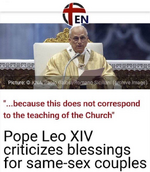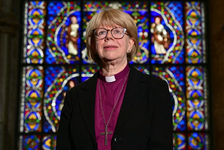The head of the ROC, tsar Alexander III did not have his gay brother, Grand Duke Sergei Alexandrovich excommunicated. Although he didn't walk around with homosexual slogans, it was widely known, especially in family circles. Neither did tsar Nicholas II. Automatic excommunication had been the law for centuries. If the EOC is one, this should worry the Greek branch too.In addition to the recent LGBT pilgrimage featuring rainbow crucifixes and men holding hands inside St. Peter's Basilica at the Vatican, Pope Leo comes out with a new banger that explicitly denies the very words of Christ Himself in the Holy Gospels
[ Edit: The OC in Poland (a church is all her people, and the faithful more so than the hierarchy), the heart of Belarusian and Ukrainian Orthodoxy in the country, this year as always voted overwhelmingly for the presidential candidate who said his dream was to officiate at the first gay wedding in Warsaw. These are very religious and proud people, unlike the rabidly hostile to Christianity Poles who voted alongside them. Again, if the OC is one- which I disagree with- then those concerned should start thinking about leaving. ]
Should he be calling for a crusade- I don't mind even though it's not reasonable in the world today- or be hostile to outsiders in the twenty first century? Is this the way to make converts or friends? For the sake of Christian minorities living in unfriendly locations, it's better to be respectful and to show good intentions, not provoke if no real help can be provided when needed.
This is not front page news, you obviously haven't left the RCC, you search deep as if looking for a reason to return, or to reassure yourself again you had made the right choice.
Does Putin or his patriarch aggressively criticize Muslims in Russia? Neither one wants them, nor is any responsible for having so many in their country, but they don't because the whole Muslim world would be angry with Russians, and turn against them in their sympathies. You can't kill them off like flies in normal circumstances. In Malaysia Muslims and Christians leave together in peace and friendship, and Pope Francis received a royal welcome. I don't see anything inherently wrong in this document, it's good diplomacy if you want to engage pagans.
Peace, Shalom, Salam, Бейбітшілік (Beybitshilik)!
I send heartfelt greetings to all those participating in the 8th Congress of Leaders of World and Traditional Religions, convened in Astana under the theme “Dialogue of Religions: Synergy for the Future.” In particular, I acknowledge with gratitude His Excellency Mr Kassym-Jomart Tokayev, President of the Republic of Kazakhstan. You have gathered from every corner of the globe to renew friendships and forge new ones, united in our common desire to bring healing to our fractured and wounded world. This theme is especially timely, underscoring the vital role of interreligious dialogue in an age marked by violent conflict.
At its heart, “synergy” means working together – both with one another and with the Divine. Every authentic religious impulse fosters dialogue and cooperation, grounded in our innate awareness of the interdependence that binds individuals and nations. From this perspective, working together in harmony is not merely a pragmatic choice, but a reflection of the deeper order of reality. It aligns with the very fabric of our shared existence as members of the one human family. In the depth of our conscience, this awareness gives rise to a profound sense of solidarity – the conviction that we are responsible for one another (cf. John Paul II, Sollicitudo Rei Socialis, 30 December 1987, 38). Solidarity, then, is synergy in action: the lived expression of loving our neighbor as ourselves on a global scale.
Such collaboration is not a call to erase differences, but rather an invitation to embrace diversity as a source of mutual enrichment. The Catholic Church, for her part, acknowledges and esteems all that is “true and holy” in other religions (Nostra Aetate, 28 October 1965, 2). Indeed, she seeks to foster authentic synergy by bringing the distinct gifts of each tradition to the table of encounter, where each faith contributes its unique wisdom and compassion in service of the common good.
In this endeavor, “synergy for the future” is not an abstract slogan but a living reality that has already borne fruit. The historic gathering of religious leaders for prayer in Assisi in 1986, convened by Pope John Paul II, demonstrated that there can be no peace among nations without peace among religions. More recently, the Document on Human Fraternity for World Peace and Living Together, signed in Abu Dhabi in 2019 by my venerable predecessor Pope Francis and the Grand Imam of Al-Azhar, Ahmad Al-Tayyeb, offered a clear blueprint for how religious synergy can advance global peace and coexistence. We witnessed this same spirit at the last meeting of this Congress in 2022, where leaders of diverse faiths, including Pope Francis, came together to condemn violence and extremism, advocate for the care of refugees, and call upon all leaders to work jointly for peace. These high-level commitments are reflected in concrete actions: when natural disasters strike, when refugees are forced to flee, or when families suffer from extreme poverty and hunger, faith communities often unite, working side by side to bring relief and hope to those most in need.
The future we envision — a future of peace, fraternity and solidarity — calls for the commitment of all hands and all hearts. When religious leaders stand together in defence of society’s most vulnerable, join in planting trees to care for our common home, or raise a united voice in support of human dignity, they bear witness to the truth that faith unites more than it divides. In this way, synergy becomes a powerful sign of hope for all humanity, revealing that religion, at its core, is not a source of conflict but a wellspring of healing and reconciliation.
With these sentiments, I trust that the work of this Congress will inspire us to work tirelessly for harmony, creating a synergy for peace – one that, as I have said before, “is unarmed and disarming, humble and persevering,” always seeking charity and drawing close to those who suffer (Urbi et Orbi, 8 May 2025). Let us pray side by side, serve shoulder to shoulder, and speak with one voice wherever human dignity is at risk. May the Almighty bless our efforts and bring forth abundant fruits for the good of all people.
From the Vatican, 14 September 2025
Last edited:




